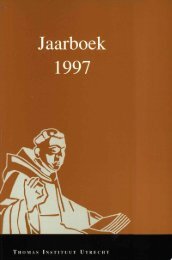Jaarboek Thomas Instituut 2006 - Thomas Instituut te Utrecht
Jaarboek Thomas Instituut 2006 - Thomas Instituut te Utrecht
Jaarboek Thomas Instituut 2006 - Thomas Instituut te Utrecht
You also want an ePaper? Increase the reach of your titles
YUMPU automatically turns print PDFs into web optimized ePapers that Google loves.
NICHOLAS OF CUSA 39<br />
Readers of this yearbook will be aware of the fact that this threefold<br />
pat<strong>te</strong>rn in our knowing God - affirming because of God's creation of<br />
all things, removing because of the infini<strong>te</strong> distance between God and<br />
creatures, being aware of God exceeding all crea<strong>te</strong>d things - has been<br />
in<strong>te</strong>rpre<strong>te</strong>d differently in the history of Thornism. One of the<br />
consequences of a 'negative reading' of Aquinas' God-talk is that it<br />
stresses Aquinas' awareness of the peculiar nature of our knowledge<br />
of God as a form of knowledge that is ut<strong>te</strong>rly dependant on God's<br />
will to reveal Godself. Therefore, Aquinas charac<strong>te</strong>rizes theology as<br />
sacra doctrina, holy <strong>te</strong>aching in which we receive our <strong>te</strong>aching from<br />
God - or Christ as God incarna<strong>te</strong> - through Scripture, and transmit<br />
this <strong>te</strong>aching to others. This explains why Aquinas may use sacra<br />
doctrina and sacra Scriptura as synonyms, and why Scripture and the<br />
tradition of the Church are so important as sources of theological<br />
reasoning.l"<br />
In the first question of his Summa Theologiae in which<br />
Aquinas discusses the nature of sacra doctrina he refers to Dionysius<br />
and his 'negative theology' once more when he wri<strong>te</strong>s about the<br />
reasons for metaphorical language in Scripture. The second of these<br />
reasons is in<strong>te</strong>resting since it might give us a hermeneutical insight<br />
about the role of religious others in our approach to God.<br />
As Dionysius says in The Celestial Hierarchy, it is more<br />
fitting that divine mat<strong>te</strong>rs should be conveyed under the figure<br />
of lowly bodies than of noble bodies, and this for three<br />
reasons. First, because by this human minds are the bet<strong>te</strong>r<br />
preserved from error; for it is clear that these things are not<br />
li<strong>te</strong>ral descriptions of divine mat<strong>te</strong>rs, which is something that<br />
might have been open to doubt had they been expressed under<br />
the figure of noble bodies, especially for those who could<br />
think of nothing nobler than bodies. Second, because this is<br />
more appropria<strong>te</strong> to the knowledge of God that we have in this<br />
life; for what God is not is clearer to us than what God is.<br />
Therefore likenesses drawn from things farthest away from<br />
God fOTTnwithin us a truer estima<strong>te</strong> that God is above<br />
wha<strong>te</strong>ver we may say or think of God. Third, because in this<br />
10 See Wilhelmus G.B.M. Valkenberg, Words of the Living God: Place and<br />
Function of Holy Scripture in the Theology of St. <strong>Thomas</strong> Aquinas, Leuven<br />
2000,8-18.








